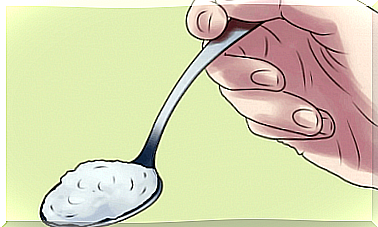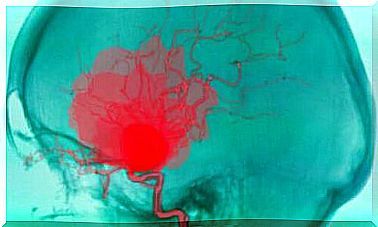Stress Insomnia: Why Do I Suffer From It And What Can I Do?

Nervousness, difficulty falling asleep, frequent awakenings, rapid heartbeats in the middle of the night and even nightmares when we finally sleep for an hour or two… Stress insomnia is a common condition that can alter our quality of life at certain times.
We know that under these circumstances it is useless to count sheep, practice meditation, or drink herbal teas. This kind of experience creates a kind of vicious circle. Its triggers are often worry and those external pressures that we cannot control.
However, after so many days without enjoying a good night’s sleep, the spirit and will weaken even more. Consequently, it is difficult to find the strengths to solve these basic problems.
Facts About Insomnia
The Spanish Sleep Society (SES) says that nearly a third of the population suffers from insomnia occasionally. However, between 10% and 12% suffer chronically. These are very exhausting states that end up affecting health in many ways. So, you need to be aware of this.
Also, keep in mind that this is a disorder that can have multiple origins. Among them, psychological states such as anxiety and stress tend to be the most frequent. What to do to manage this? Let’s analyze the subject in the space below.

Stress insomnia: symptoms, causes and strategies to control it
When it’s hard to fall asleep, many of the daily formulas we’re used to are useless. Telling ourselves “I need sleep, I need sleep” doesn’t work, because these formulas aren’t useful for the brain, especially when it’s stuck in that mental hyper-arousal where thoughts don’t stop, where the labyrinth of worries never rests.
Studies such as those carried out at Laval University in Sainte-Foy, Canada, indicate that every stressor alters our sleep at night.
However, he will do it with greater or lesser intensity based on our coping skills. This implies something decisive: in the treatment of insomnia in these cases, it is essential to combine psychological therapy with a pharmacological approach. Let’s look at more data.
What are the symptoms associated with stress insomnia?
There are different types of stress. On the one hand, we have acute stress, related to those daily tasks or challenges that take our calm and lead us to a state of activation, worry and relative anguish.
Now, it is possible, in turn, that we are suffering from episodic acute stress, in which case, by not having controlled these daily pressures, we have led to a more problematic situation. Therefore, we are not productive at work and have more health problems.
The most worrisome type of stress is undoubtedly the chronic type. It is a condition associated with previous traumas or very distressing situations that keep us stuck for years: for example, burnout syndrome.
Symptoms associated with stress insomnia arise in cases of episodic acute stress and chronic stress. The manifestations are as follows:
- Trouble falling asleep (may take hours).
- Frequent awakenings and poor quality rest. We often wake up more exhausted than when we went to sleep.
- Tachycardia in the middle of the night.
- The mind does not rest, negative ideas, irrational and catastrophic thoughts come to us.
- If we manage to sleep two hours straight, we often have nightmares.
- Tension headaches can also appear at night.
- Muscle pain makes it impossible to find a good sleeping position.
What is the cause?
Why do stress states affect night rest? Many of us have asked ourselves this question more than once. The more the rest is needed, the more difficult it is to achieve it.
The reason lies in what we know as the Monroe Hypothesis, which explains why people who suffer from anxiety and stress find it very difficult to sleep.
- People who deal with these psychological states accumulate a high physiological activation due to high levels of cortisol and adrenaline. This hyperarousal doesn’t go away at night, but it can intensify.
- The reason? When we reach the silence of our bed, the mind starts to work even harder. This mental energy further overloads the tension in the body and brain.

What strategies should we apply to reduce stress insomnia?
The first – and most decisive – step is to know the real cause of insomnia. It is advisable to go to the doctor to understand what is mediating this sleep disorder. Once the organic causes have been discarded, let’s focus on the psychological plane to make changes. These are some keys.
rigid sleep schedules
It is important that we take care of sleep hygiene and try to get up and sleep at the same time.
Reduce exposure to electronic devices
Two hours before going to bed, we should avoid exposing ourselves to cell phone or computer screens. The blue light from these devices acts as a stimulant.
Avoid going to bed with worries; it is better to write them in a notebook
The pillow cannot be the repository of all your worries. It is forbidden to go to bed with a mind full of obsessive thoughts, anxieties and ideas. It’s better to write everything down in a notebook. We can even try to write a motion for a resolution.
Prioritize and make small changes to feel good
To control stress insomnia, changes are essential. For this, the healthiest thing is to clarify what are our priorities and what are the secondary aspects that we can eliminate in order to have a better well-being. Let’s remember that self-care is not just taking care of the physical or food. It’s also about dedicating quality time to ourselves.
Physical activity, light dinners and breathing exercises
Taking a walk or jogging in the afternoon allows us to release that stress accumulated throughout the day. After that little exercise session, we could have a light dinner and reduce physical and mental activity. Deep breathing exercises or reading a book will allow us to improve the quality of rest.
Seeking professional service is important
When the strategies discussed above do not work or the symptoms end up getting worse, it is best to seek professional help. Insomnia that is not resolved in time tends to impact health and quality of life.
Likewise, uncontrolled stress ends up altering almost every area of our lives. Therefore, if we are not able to deal with this, the ideal is to seek specialized psychological care. Let’s keep that in mind.








